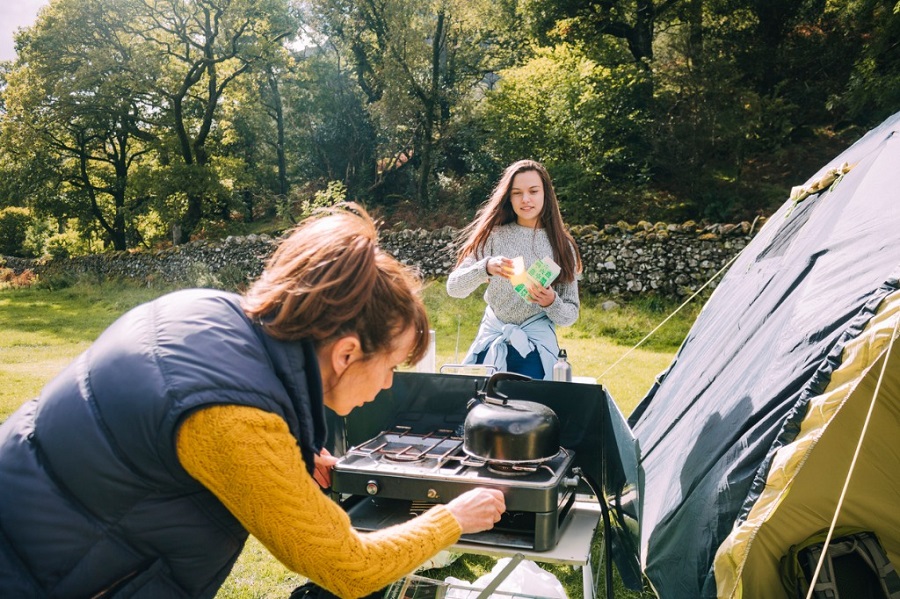Keep hazardous chemicals out of the mix when hiking and camping
The mountains are calling! What's in your backpack?

Hazardous chemicals are not part of the ten essentials for hiking and camping, but they can creep into backpacks nonetheless. And they can eventually contaminate the land and water—remember, rain picks up whatever it touches, and carries it to the nearest waterway. That’s hardly what anyone wants to do when basking at a mountain overlook, glen of wildflowers, or alpine lake.
So, before you head to the mountains, take a fresh look at what you are packing in and see if you really need it.
There are two overarching principles to keep in mind:
1. Ideally, look for products that are alternatives to products containing hazardous chemicals.
2. If you can’t avoid products with hazardous chemicals, make a plan to use a safe method of disposal.
Below, you'll find a list of some common hazardous products you might be bringing with you on your next trip — and some safer alternatives to consider instead.
Camping Stoves
Small, single-use gas canisters are convenient but not reusable and very hard to recycle. Learn how to dispose of propane and butane tanks here.
Safer alternatives:
- For gas-powered stoves, ditch single-use cans of propane, in favor of refillable options.
- If you are in the market for a new camping stove, consider a liquid fuel stove (also known as a white gas backpacking stove). While heavier to carry, the fuel is generally cheaper and lasts longer than propane. It’s easier to gauge how much fuel is left in the bottle. And if you venture out in the winter, you can melt large volumes of snow too.
Aerosol Products (Bug Spray and Sunscreen)
Aerosols spray chemicals that can affect climate change, as well as harm kids and pets. Any aerosol bottle that isn’t empty is hazardous waste. Dispose of the aerosol bottle at one of King County’s four hazardous waste sites or the traveling Wastemobile.
Batteries (Flashlights and Headlamps)
Batteries may contain toxic or corrosive materials. Individually package or put tape on the ends of batteries to prevent a fire hazard before disposal. Dispose in the garbage or at a hazardous waste collection site.
Safer alternatives:
- Consider purchasing rechargeable LED flashlights, camping lanterns, or headlamps.
- For emergencies on the road, keep a no-battery flashlight in your car. These wind up (hand crank) models don’t create as much light as an LED option, but are good backup for road trips.
- For regular flashlights and headlamps, choose rechargeable or recyclable batteries.
Ice Packs
Depending on what’s in your ice pack, it may not be toxic, but pouring the gel down your pipes when you get home can cause a nasty clog later! Dispose at a hazardous waste collection site.
Safer alternative: Refreeze and reuse your ice packs. Keep them in the freezer between uses, and then toss into a cooler or backpack for your next trip.
Lighter Fluid
Lighter fluid can release volatile organic compounds into the atmosphere, a source of pollution. Dispose at a hazardous waste collection site.
Taking a mini grill out for car camping? Here are some clever hacks to get your fire going without lighter fluid:
- Ball up a few sheets of newspaper, under the charcoal grate, and pile coals above.
- Use a high-proof alcohol such as whiskey to douse wadded up paper towels or cotton balls. Place into your pile of coals and light.
- Use a cardboard egg crate: Take half of the bottom of the crate, place coals into it, light opposite corners of the crate, and the cardboard will burn slowly enough to light your coals.
- Our favorite hack for starting a fire: use Doritos, or any heavily seasoned snack chip!
These choices can help keep nature as pristine as you found it, and also protect the hikers and campers in your party including children and pets. If you would like more help finding safe disposal methods or alternatives to hazardous waste, call 206-296-4692.
 Translate
Translate